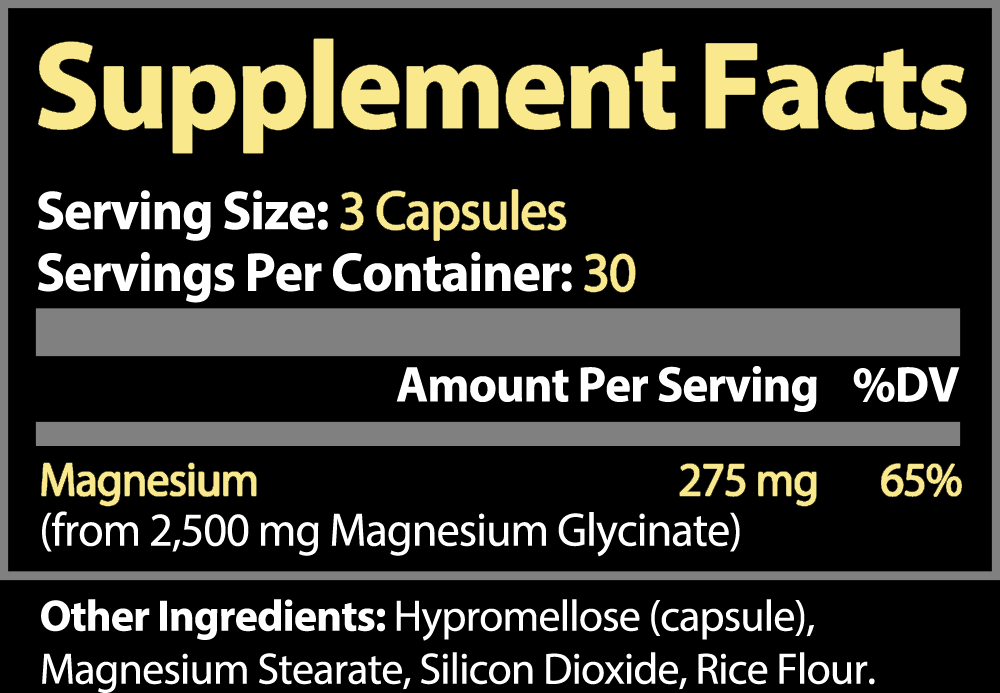
Magnesium Glycinate: Benefits, Uses, Comparisons
Share
Magnesium is an essential mineral that plays a crucial role in numerous bodily functions, including muscle and nerve function, blood sugar control, and blood pressure regulation.

 The five domains of intrinsic capacity and the subdomains in which magnesium plays a significant role (adapted from Souza, A. C. R., et al., 2023)
The five domains of intrinsic capacity and the subdomains in which magnesium plays a significant role (adapted from Souza, A. C. R., et al., 2023)
Among the various forms of magnesium supplements available today, magnesium glycinate has gained significant attention due to its high bioavailability and minimal side effects.
In this article, we'll explore the benefits of magnesium glycinate, compare it with other popular forms like magnesium citrate, oxide, and threonate, and discuss its dosage, side effects, and impact on sleep and anxiety.
What Is Magnesium Glycinate?
Magnesium glycinate, also known as magnesium bisglycinate, is a compound formed by combining magnesium with glycine, an amino acid. This form of magnesium is highly absorbable and is less likely to cause digestive issues compared to other forms, like magnesium oxide or citrate.
Magnesium glycinate consists of 14% of elementary Magnesium and 86% of amino acid Glycine, which by itself also helps improve sleep, and is beneficial for many other health outcomes.
Benefits of Magnesium Glycinate
1. 🙏 Relaxation & Reduced Anxiety

Magnesium Status and Stress (adapted from Pickering, G. et al., 2020)
Animal studies
5 animal studies have shown that the deficiency of Magnesium (Mg) elevates anxiety states. [1, 2, 3, 4, 5]
- "...we report that Mg-depletion leads to enhanced depression- and anxiety-related behavior in mice..." [2]
- "Overall, the present findings demonstrate the robustness and validity of the Mg2+deficiency model as a mouse model of enhanced anxiety..." [4]
2 studies have shown that supplementing with Magnesium reduces anxiety-related behavior. [6, 7]
- "Combination of Mg salts and [vitamin B6] can be effective at treating some behavior form of primary Mg deficiency." [6]
- "The antidepressant- and anxiolytic-like effect of Magnesium was demonstrated in groups treated acutely and chronically with Magnesium..." [7]
Human studies
7 clinical trials have studied the effects of Magnesium supplementation on measures of anxiety.
5/7 studies reported significant positive results. [8, 9, 10, 11, 12] Several of these studies combined Magnesium with other substances, like plant extracts [8] and vitamin B6 [10, 12].
- "...After 6 months of magnesium prophylaxis... physical and psychosocial well-being improved. Children also reported fewer anxiety and depressive symptoms." [9]
- "At the end of the study, the mean level of anxiety and depression was significantly lower in the intervention group than the control group, moreover, mean sleep quality improved in the intervention group compared to the control group" [11]
1 study has shown no results, but the dosage in that study was very low — 65 mg of elemental magnesium. [13]
1 study reported decreased anxiety scores only when magnesium was combined with 50 mg of vitamin B6. However, there was also evidence that the bioavailability of the magnesium oxide in that study was too low. [14]
In summary, there were improvements in six different anxiety & depression scores in those studies. [15, 16]
2. 😴 Better Sleep

The Neurochemistry of Magnesium in Stress & Sleep (adapted from Pickering, G. et al., 2020)
Magnesium
By 2024, there were 7 clinical studies on the efficiency of Magnesium in improving sleep with clear significant results.
2/7 studies reported no efficiency, but:
- in one study, the dosage was extremely low: ~12 mg of elementary Magnesium [17];
- in another study, Mg was taken with the breakfast, which is too early [18].
5/7 studies reported positive results of Magnesium intake on sleep parameters. [11, 19, 20, 21, 22]
- "...Sleep efficiency improved from 75±12% to 85±8%...Our study indicates that magnesium treatment may be a useful alternative therapy in patients with mild or moderate RLS- or PLMS-related insomnia." [19]
- "Our results suggest that Mg(2+) partially reverses sleep EEG and nocturnal neuroendocrine changes occurring during aging." [20]
- The results of this study should be interpreted with caution, because no control group with placebo was investigated. Both subjective and, partly, objective parameters of sleep improved during the 4-week study period" [21]
- "Supplementation of magnesium appears to improve subjective measures of insomnia such as ISI score, sleep efficiency, sleep time and sleep onset latency, early morning awakening, and likewise, insomnia objective measures such as concentration of serum renin, melatonin, and serum cortisol, in elderly people." [22]
- "At the end of the study, the mean level of anxiety and depression was significantly lower in the intervention group than the control group, moreover, mean sleep quality improved in the intervention group compared to the control group" [11]
Glycine
Magnesium glycinate consists of:
- 14% of elementary Magnesium
- and 86% of the amino acid Glycine,
which by itself also helps improve sleep, and is beneficial for many other health outcomes.
3 clinical studies have shown that Glycine improved sleep quality, alertness, and cognition, and decreased fatigue and sleepiness in dosages of 3 g/day before bedtime. [23, 24, 25]
- "We found that orally administered glycine acts on
NMDARs in the SCN and decreases CBT, resulting in an improvement in sleep quality." [23] - "...ingestion of glycine before bedtime seems to produce subjective and objective improvement of the sleep quality..." [24]
- "The glycine ingestion significantly improved the following elements: “fatigue”, “liveliness and peppiness”, and “clear-headedness”. These results suggest that glycine produced a good subjective feeling after awakening from sleep." [25]
Magnesium Glycinate Sleep Dosage
The magnesium glycinate dosage for sleep varies depending on the individual, but a typical magnesium glycinate sleep dosage ranges from 200 mg to 400 mg (of elementary Magnesium) taken 30 minutes to an hour before bedtime.
3. 😃 Reduced Headaches
A lot of scientific literature suggests a relationship between Magnesium deficiency and mild and moderate tension-type headaches and migraines. [26, 27]
A Cochrane review grades Magnesium as one of the strongly recommended treatments for migraine headaches. [28]
5 randomized placebo-controlled clinical studies have shown the efficiency of Magnesium in reducing frequency, duration, and intensity of migraines. [29, 30, 31, 32, 33]
- "81 patients aged 18–65 years with migraine...received oral...magnesium...daily for 12 weeks or placebo. In weeks 9–12 the attack frequency was reduced by 41.6% in the magnesium group and by 15.8% in the placebo... The number of days with migraine and the drug consumption for symptomatic treatment per patient also decreased significantly in the Magnesium group..." [29]
- After a 3-month treatment period with oral Magnesium for migraine without aura, there were a significant improvement in attack frequency and severity. [30]
- Magnesium increased the efficacy of ibuprofen and acetaminophen for the acute treatment of primary migraine in children. Magnesium pretreatment induced a significant decrease in pain intensity, and in pain frequency. [31]
- "...magnesium could enhance the antimigraine properties of sodium valproate in combination therapy and reduce the required valproate dose for migraine prophylaxis." [32]
- "This study has shown that 500 mg magnesium oxide appears to be effective in migraine prophylaxis similar to valproate sodium without significant adverse effect." [33]
4. 💪 Muscle Health, Growth & Cramps Reduction
Magnesium is essential for muscle health, growth, and recovery.
- A 2023 review on the role of Magnesium in Muscle Health: "...skeletal muscle houses approximately 20% of the body’s total magnesium...It plays a central role in processes such as protein synthesis, energy production, and muscle contraction while also offering anti-inflammatory and antioxidant benefits" [34]
Although Magnesium intake can't provide additional muscle growth, its deficiency can significantly slow muscle growth and recovery.
- Over 50% of the population may have Magnesium deficiencies, consuming less than 360-420 mg/day (5–7 mg/kg/day). [35, 36]
- A 2022 study of 766 adolescents 14-18 years old in the southeast US has concluded that "The average daily magnesium intakes were ~200 mg and ~205 mg for males and females, respectively, far below the recommended amounts of 410 mg for males and 360 mg for females...Almost none of the adolescents met the recommendations...Lower magnesium intake was associated with higher CRP [inflammation marker] and lower muscle mass." [37]
Moreover, athletes require more Magnesium than sedentary people:
- "...individuals engaged in intense exercise should have a Mg requirement 10–20% higher than sedentary people...These studies showed that Magnesium supplementation reduced muscle soreness, improved performance, recovery..." [38]
And, Magnesium can help with nocturnal muscle cramps:
- "The number of nocturnal leg crumps (NLC) episodes has significantly decreased by the end of the study..., indicating a higher decrease in the Magnesium group as compared to the placebo group (− 3.4 vs − 2.6). In addition, Magnesium treatment resulted in a greater reduction in NLC duration and greater improvement in sleep quality as compared to placebo." [39]
5. ❤️ Overall Health & Well-being
Magnesium
Magnesium is crucial for the work of around 300 enzymes in 600 biochemical reactions, across all body systems. Magnesium regulates muscle contraction, protein synthesis, energy production, blood sugar control, heart contraction, blood pressure, and many other crucial processes. [40, 41]
There were too many studies of Magnesium on different aspects of human health, so here are just a few summaries from the reviews of those studies:
- "Because of Magnesium’s many functions within the body, it plays a major role in disease prevention and overall health. Low levels of magnesium have been associated with a number of chronic diseases including migraine headaches, Alzheimer’s disease, cerebrovascular accident (stroke), hypertension, cardiovascular disease, and type 2 diabetes mellitus." [42]
- "...Increasing dietary magnesium intake is associated with a reduced risk of stroke, heart failure, diabetes, and all-cause mortality..." [43]
- "...high Mg intake is associated with lower risk of major cardiovascular risk factors (mainly metabolic syndrome, diabetes and hypertension), stroke and total cardiovascular diseases" [44]
- "Level I evidence supports the use of magnesium in the prevention and treatment of many common health conditions including migraine headache, metabolic syndrome, diabetes, hyperlipidemia, asthma, premenstrual syndrome, preeclampsia, and various cardiac arrhythmias. Magnesium may also be considered for prevention of renal calculi and cataract formation, as an adjunct or treatment for depression, and as a therapeutic intervention for many other health-related disorders." [45]
- "...Magnesium supplementation can not only preserve liver function, but also slow the progression of liver disease, and reduce the mortality associated..." [46]
- "In all studies there was a benefit both in terms of bone mineral density and fracture risk." [47]
Glycine
Magnesium glycinate consists of 14% of elementary Magnesium, and 86% of amino acid Glycine.
In animal studies, glycine has shown:
- anti-inflammatory and immunomodulatory effects [48, 49, 50].
- lifespan extension of C. elegans by up to 33% [51, 52], rats by ~20% [53], and mice by 6% [54].
In human studies, glycine has shown:
- sleep quality improvement and enhanced alertness and cognition next day [23, 24, 25]
- and protective effect against metabolic diseases [55, 56, 57]
Magnesium Glycinate vs Other Forms of Magnesium
Magnesium Glycinate vs Citrate
When comparing magnesium glycinate vs magnesium citrate, both forms are popular, but they serve different purposes. Magnesium citrate is well-known for its laxative effect, making it a good option for those dealing with constipation. However, magnesium glycinate and citrate differ significantly in absorption and side effects. Magnesium glycinate is absorbed more effectively and is gentler on the stomach, making it a better choice for long-term supplementation, especially for sleep and anxiety.
Magnesium Glycinate vs Oxide
Magnesium glycinate vs oxide is another common comparison. Magnesium oxide contains a higher percentage of elemental magnesium, but it's not as well absorbed as glycinate. Moreover, magnesium oxide is more likely to cause digestive discomfort, such as diarrhea, compared to the more tolerable magnesium glycinate.
Magnesium Glycinate vs Threonate
When comparing magnesium glycinate vs threonate, it's important to note that magnesium l-threonate is often touted for its potential cognitive benefits, such as improving memory and focus. However, for general magnesium supplementation, especially for sleep and anxiety, magnesium glycinate is usually the preferred choice due to its calming effects and ease of absorption.
Magnesium Bisglycinate vs Magnesium Glycinate
You might also come across magnesium bisglycinate vs magnesium glycinate. It's important to understand that these terms are often used interchangeably. Both refer to the same compound and offer the same benefits, so there's no significant difference between the two.
Magnesium Glycinate Dosage and Side Effects
Magnesium Glycinate Dosage
The recommended magnesium glycinate dose varies depending on individual needs. For general health, a typical magnesium glycinate dosage ranges from 200 mg to 400 mg per day. However, for specific conditions like sleep or anxiety, the dosage may differ.
Side Effects of Magnesium Glycinate
While magnesium glycinate is generally well-tolerated, there are some potential side effects of magnesium glycinate to be aware of. These may include mild digestive issues, such as nausea or loose stools, especially if taken in high doses. However, these side effects are less common compared to other forms of magnesium.
Conclusion
Magnesium glycinate is an excellent choice for those looking to improve sleep, reduce anxiety, or simply ensure adequate magnesium intake.
Compared to other forms like citrate, oxide, and threonate, magnesium glycinate offers superior absorption with minimal side effects, making it a top pick for many. Whether you’re looking for a solution for better sleep or anxiety relief, magnesium glycinate could be the ideal supplement for you.
Remember to consult with a healthcare provider before starting any new supplement regimen to determine the appropriate magnesium glycinate dosage for your specific needs.

























